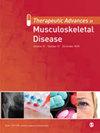The protocol of a clinical effectiveness trial comparing standard step-up care, early combination DMARD therapy and early use of TNF inhibitors for the treatment of moderate to severe psoriatic arthritis: the 3-arm parallel group SPEED randomized controlled trial
IF 3.4
2区 医学
Q2 RHEUMATOLOGY
引用次数: 0
Abstract
Objectives:The aim of the Severe Psoriatic arthritis – Early intervEntion to control Disease trial is to compare outcomes in psoriatic arthritis (PsA) patients with poor prognostic factors treated with standard step-up conventional synthetic disease-modifying anti-rheumatic drugs (csDMARDs), combination csDMARDs or a course of early biologics.Design:This multicentre UK trial was embedded within the MONITOR-PsA cohort, which uses a trial within cohort design.Methods and analysis:Patients with newly diagnosed PsA and at least one poor prognostic factor (polyarthritis, C-reactive protein >5 mg/dL, health assessment questionnaire >1, radiographic erosions) were randomized equally and open-label to either standard care with ‘step-up’ csDMARD therapy, initial therapy with combination csDMARDs (methotrexate with either sulfasalazine or leflunomide) or to early biologics induction therapy (adalimumab plus methotrexate). The primary outcome is the PsA disease activity score at week 24.Ethics:Ethical approval for the study was granted by the South Central Research Ethics Committee (ref 18/SC/0107).Discussion:Treatment recommendations for PsA suggest more intensive therapy for those with poor prognostic factors but there are no studies that have previously used prognostic factors to guide therapy. Applying initial intensive therapy has shown improved outcomes in other inflammatory arthritides but has never been tried in PsA. Combination csDMARDs have shown some superiority over single therapies but there are limited data and concerns about side effects. Early use of biologics has also been shown to be superior to methotrexate but these drugs are costly and not usually funded first line. However, if a short course of biologics can rapidly suppress inflammation allowing treatment to be withdrawn and response maintained on methotrexate, this may be a cost-effective model for early use.Trial registration:ClinicalTrials.gov (NCT03739853) and EudraCT (2017-004542-24).在治疗中重度银屑病关节炎方面,比较标准逐步护理、早期DMARD联合疗法和早期使用TNF抑制剂的临床疗效试验方案:3臂平行组SPEED随机对照试验
目的:"严重银屑病关节炎--早期干预控制疾病 "试验旨在比较具有不良预后因素的银屑病关节炎(PsA)患者接受标准阶梯式常规合成改善病情抗风湿药物(csDMARDs)、联合csDMARDs或早期生物制剂治疗的疗效。设计:这一英国多中心试验被纳入MONITOR-PsA队列,该队列采用队列内试验设计。方法与分析:对新诊断为PsA且至少有一个不良预后因素(多关节炎、C反应蛋白5 mg/dL、健康评估问卷1、放射学侵蚀)的患者进行平等、开放标签随机分组,分别接受 "阶梯式 "csDMARD疗法的标准护理、csDMARDs联合疗法的初始疗法(甲氨蝶呤联合磺胺柳氮或来氟米特)或早期生物制剂诱导疗法(阿达木单抗联合甲氨蝶呤)。讨论:PsA的治疗建议建议对预后不良的患者进行强化治疗,但目前还没有研究使用预后因素来指导治疗。在其他炎症性关节炎中,应用初始强化治疗可改善预后,但在PsA中却从未尝试过。csDMARDs 联合疗法已显示出优于单一疗法,但数据有限,且副作用令人担忧。早期使用生物制剂也被证明优于甲氨蝶呤,但这些药物价格昂贵,通常不作为一线治疗药物。然而,如果生物制剂的短期疗程可以迅速抑制炎症,从而可以撤消治疗并维持甲氨蝶呤的反应,这可能是早期使用的一种具有成本效益的模式。试验注册:ClinicalTrials.gov(NCT03739853)和EudraCT(2017-004542-24)。
本文章由计算机程序翻译,如有差异,请以英文原文为准。
求助全文
约1分钟内获得全文
求助全文
来源期刊

Therapeutic Advances in Musculoskeletal Disease
Medicine-Rheumatology
CiteScore
6.80
自引率
4.80%
发文量
132
审稿时长
18 weeks
期刊介绍:
Therapeutic Advances in Musculoskeletal Disease delivers the highest quality peer-reviewed articles, reviews, and scholarly comment on pioneering efforts and innovative studies across all areas of musculoskeletal disease.
 求助内容:
求助内容: 应助结果提醒方式:
应助结果提醒方式:


